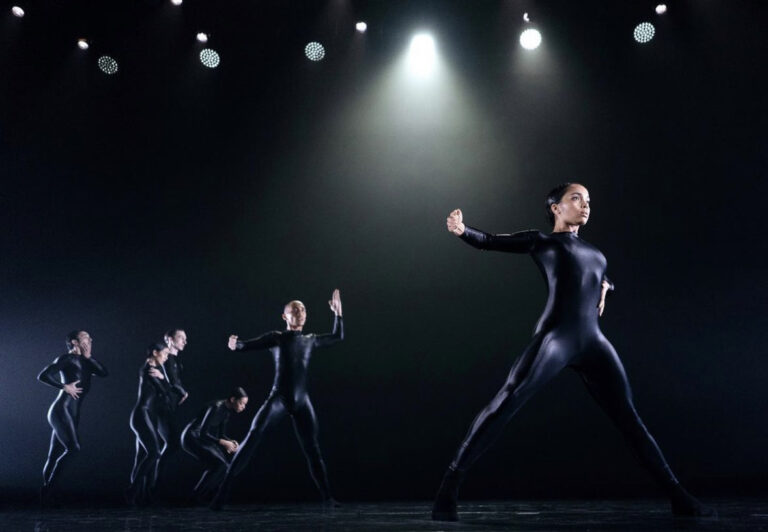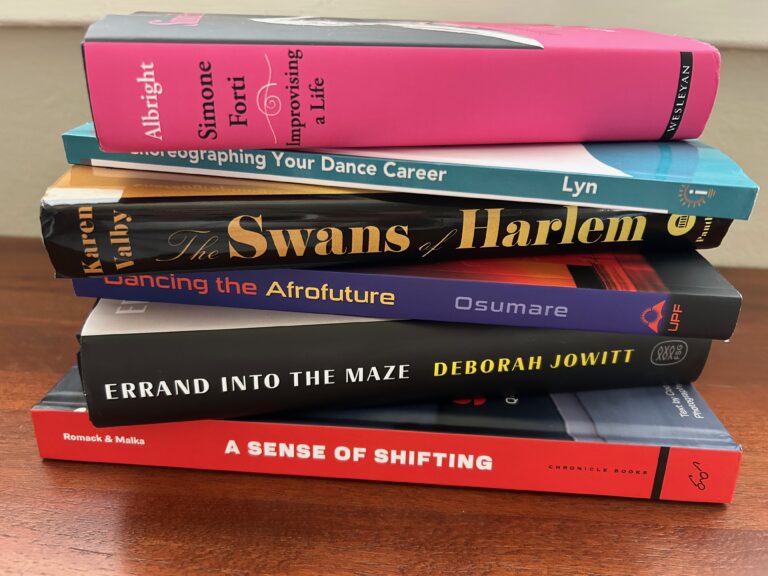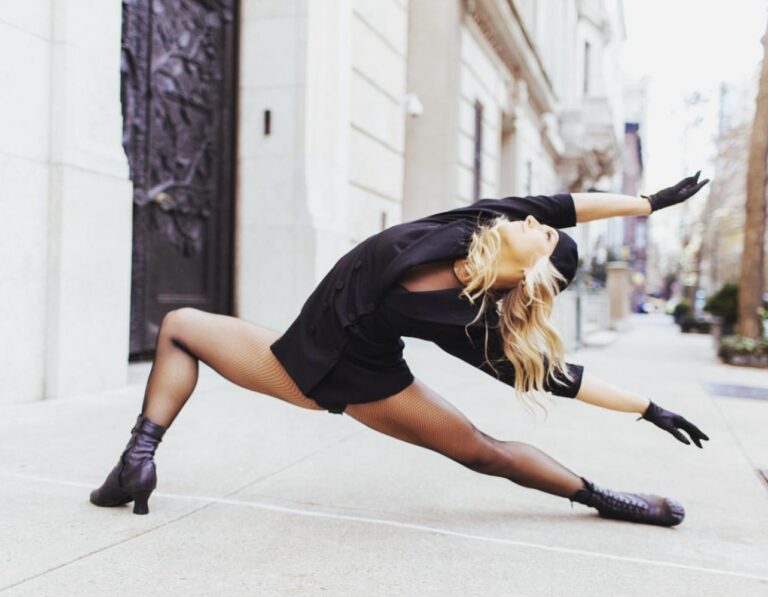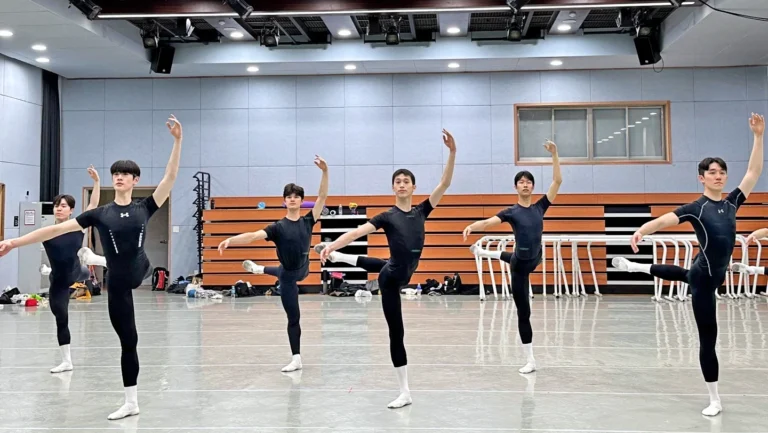An old Phil Collins song poses the idea of “two hearts, living in just one mind.” For Tabitha and Napoleon D’umo, this idea is very much reality. The solidarity they share translates not only to their marriage of 10 years, but also to their work as two of today’s most renowned choreographers and instructors. From finishing each other’s sentences to wearing matching outfits to class (“in the early days!” insists Napoleon), the pair is truly in sync. The unique vision that arises from their collaboration gives each of their projects—including “So You Think You Can Dance,” “America’s Best Dance Crew” and Celine Dion’s “Taking Chances” concert tour—double the impact. Find out what makes this terrific twosome tick in this exclusive DT interview.
The Genesis
While growing up on opposite coasts, Tabitha and Napoleon had vastly different dance upbringings. As a B-boy, Napoleon often made the trek from his hometown of Apple Valley, California, to Los Angeles, where the ’80s breakdancing scene was in full effect. “There was a parking lot on Hollywood Boulevard by Grauman’s Chinese Theatre where people would break every week,” recalls Napoleon, who was cast as an extra in the 1984 breakdancing movie Breakin’ 2: Electric Bugaloo. “I got to watch the best in the business, like Popin’ Pete and Mr. Wiggles. Freestyling was how it all started for me.”
Tabitha’s dance training was slightly more traditional. Born Tabitha Cortopassi, she studied jazz dance while growing up in southern New Jersey. In high school, she joined the dance and cheer teams—yet maintains that she learned the most from MTV. “There were no hip-hop classes, so the only training I got in that area was by watching music videos,” explains Tabitha. “You had to be self-taught. I was inspired by Paula Abdul, Michael Jackson and Janet Jackson.”
It was at University of Nevada–Las Vegas that the dancing duo met for the first time. Although he was a pre-med student and she was majoring in communications, the two got to know each other in—where else?—dance class. “I was a buff bodybuilder at the time, about 210 pounds,” says Napoleon. “I had some fine arts requirements, so rather than taking history of rock ’n’ roll, I thought I’d take some jazz and modern classes. Tabitha and her dance team friends walked by the dance room and saw me doing leaps across the floor.” Of their fateful encounter, Tabitha remembers thinking, “‘Is that Napoleon?’ We had always run in the same circles, and he’d always pretended he couldn’t dance. He was so busted!”
After discovering Napoleon’s dance chops, Tabitha convinced him and his bodybuilder friends to practice stunts with the cheer and dance team. The coach’s resulting offer of a full scholarship convinced a reluctant Napoleon to join the squad, and Tabitha and Napoleon became fast friends—and, a few years later, a couple.
Together, they auditioned for a local dance company, Culture Shock, which soon led to numerous choreography and performance opportunities. The two began choreographing industrials for such companies as Nike, Matrix and Levi’s, as well as teaching at conventions and working with pop stars like Jody Watley and Kristine W.
All of a sudden, despite the fact that Napoleon was poised to attend medical school in Reno and Tabitha had a job in public relations at the Rio Casino in Vegas, the pair began to consider pursuing dance professionally full-time. “All through college, we’d been part of this company and made money doing it, but not enough to think of it as a career,” explains Tabitha. Napoleon adds, “That was the start of us saying, ‘Maybe we should go to Los Angeles and do this.’”
In 1999, a year after getting married, the D’umos did just that. “We went from being the choreographers in Las Vegas to having to start over in L.A.,” says Napoleon. “It’s been an amazing road.”
The Gamble Pays Off
In the 10 years since they left Las Vegas, the D’umos have amassed a hefty resumé of credits that includes assistant direction on concert tours for Christina Aguilera, Ricky Martin and Kanye West, as well as choreography for artists like Solange and Missy Elliott. The couple has also choreographed for “Zoey 101,” the Grammys and the Billboard Music Awards, as well as several NFL and NBA dance teams.
Earlier this year, Tabitha and Napoleon made their debut as choreographers and judges on Fox’s hit show “So You Think You Can Dance.” Working alongside top names like Mia Michaels, Tyce Diorio and Wade Robson, Tabitha and Napoleon suddenly earned national name recognition from millions of viewers. “We’ve choreographed in a lot of different areas, but this show has raised our profile more than any other project,” acknowledges Tabitha.
Along with creating the contestants’ routines, the pair also coached the dancers on how to win over the audience and play to the camera. “Viewers don’t know anything about the steps—it’s about seeing things through a non-dancer’s eyes,” says Napoleon. “Sure, they love the big tricks, but in general, the audience just wants you to make them feel something. Dancers often get so caught up in steps that they forget about the most important things—body language, facial expressions. There should be an emotion for each song, or else why play the music?”
This approach also comes into play in their work on the MTV show “America’s Best Dance Crew.” As artistic directors for “ABDC,” Tabitha and Napoleon work behind the scenes with each hip-hop crew to perfect and polish routines—as well as create an overall vibe for the show. Also raising the couple’s on-air profile is “Rock the Reception,” a TLC show on which they create “first dance” numbers for newlyweds.
Tabitha and Napoleon are thrilled to be part of television shows that are bringing dance to the pop-culture forefront—making the 16-hour days well worth it. “This trend is bringing dancers into the limelight and showing America that they can entertain without being the supporting act,” says Napoleon. Adds Tabitha, “This is the first time in a long time that choreographers are being celebrated as well as dancers. Yet, bottom line, we do what we do because we love it—not because of the recognition.”
Looking back, the D’umos believe that it was their time in Las Vegas that gave them the unique perspective to stand out. “[Audiences] want you to tell them a story that either makes them laugh or cry,” says Napoleon. “Starting out doing industrials in Vegas was where we learned how to do that. All the conventions wanted to see skin or people flying through the air. We had to learn how to entertain them with hip hop without having ‘T&A’ or Cirque du Soleil. As a result, our work is largely centered on storytelling and physical comedy.”
Teaching in Tandem
Although Tabitha and Napoleon’s schedule is jam-packed with jobs, they still consider it crucial to find time to teach, which they do—“always together,” says Napoleon—at EDGE Performing Arts Center and Millennium Dance Complex in Los Angeles, as well as for conventions like JUMP and Monsters of HipHop. (They also directed this year’s Monsters of HipHop Show in August.) “Teaching forces us to continue to push ourselves so we don’t get rusty or stale,” says Tabitha. “Kids nowadays are so talented and amazing, and they’ll tell you when your stuff is wack.” Napoleon agrees: “It keeps you on your game as far as what’s new and hip. If you just stay in the choreography world, you can really get lost on how hip-hop style is evolving.”
Tabitha adds that students today don’t suffer from the dearth of training opportunities in hip hop that existed when she was growing up. “I mimicked the music videos because that’s all I was exposed to,” she says. “My career in hip hop started much later; kids today at 10 years old are where I was when I was 19. I think it’s a great thing, but it does make me nervous because they can burn out quickly. You just hope that they still have time to enjoy what they love.”
Though many might think teaching and choreography go hand-in-hand, Tabitha and Napoleon are adamant that their approach to each couldn’t be more different. Teaching class allows them to focus more on technique, while their choreography is centered on storyline and staging. “When teaching, you’re giving specific instruction on steps, whereas in choreography, you’re just providing a skeleton for the dancers to look good and tell a story,” explains Napoleon.
Of course, the couple’s strong belief in storytelling translates to the classroom as well. “Any dancer’s job is to tell a story through his or her body,” says Tabitha. “That’s what we always preach in our classes: ‘Figure out exactly what this song says to you.’ It doesn’t always have to be serious; it can be funny, angry, silly, sad—but I should be able to watch you and get it.”
Whether at a convention or in the studio, one trademark of their classes is the element of fun. The pair maintains a high-energy and nurturing hip-hop environment. Says Napoleon, “The dancers should feel so comfortable that they’re ready to let loose. If they go overboard, we can calm them down—but I’d rather have that than them not be willing to go for it and try.”
Their approach is a natural extension of their friendly personalities, but Napoleon also recalls a teacher from his early days who was particularly influential. “Tony Stone would high-five me every time he saw me and say, ‘So good to see you,’” he recalls. “In my heart, I knew there was no way he knew who I was, but I felt so good every time I was done with class and couldn’t wait to take another one.”
Off the Clock
With so many different projects, how do Tabitha and Napoleon keep their personal and professional life separate? “We don’t,” says Tabitha, laughing. “Even when we go to the movies or to dinner, we’ll talk about, ‘What if?’ When we hear songs on the radio, we’ll say, ‘That would make a great ‘So You Think’ number.’”
Working as a team, Tabitha and Napoleon collaborate on all of the creative duties, but split up the behind-the-scenes work. Tabitha calls herself the “dorky, nerdy organizer,” coordinating schedules and paperwork, while Napoleon handles music mixing and the financial side of things. “We look at it as a hobby, so it doesn’t feel like work,” he says. “We have a studio in our house, and when we feel like dancing, we just jump up and do it!”
Of course, they don’t see eye-to-eye all of the time. Tabitha prefers to sit down together for brainstorming sessions, whereas Napoleon likes to come up with ideas while jogging or driving. Yet even when they disagree on how choreography should look, they always hear each other out with respect. “I really take his opinion seriously and vice versa,” says Tabitha. “We try to stay patient, listen and let go of our egos. Maybe because we’re husband and wife, we know at the end of the day we’re going home together and all of our decisions will help both of us prosper.”
Looking ahead, Tabitha and Napoleon have no plans to slow down. Riding the momentum of their newfound fame, they hope to executive produce and direct a hip hop–oriented Broadway musical, as well as take on more large-scale gigs as artistic directors. “Assistant directing Celine’s last tour really opened the door for us,” says Napoleon. “Now we’re artistic directing the live tour of ‘America’s Best Dance Crew,’ and that’s really the direction we want to go.”
No matter what, Tabitha and Napoleon plan to navigate the path together—while loving every minute of it. “We just have fun,” says Napoleon. “I could have gone to med school, and she could have been in the advertising world. But we’re dancing! It doesn’t get any better than that.” DT
Jen Jones is a freelance writer and certified
BalleCore instructor in Los Angeles. Her website is www.creative-groove.com.



